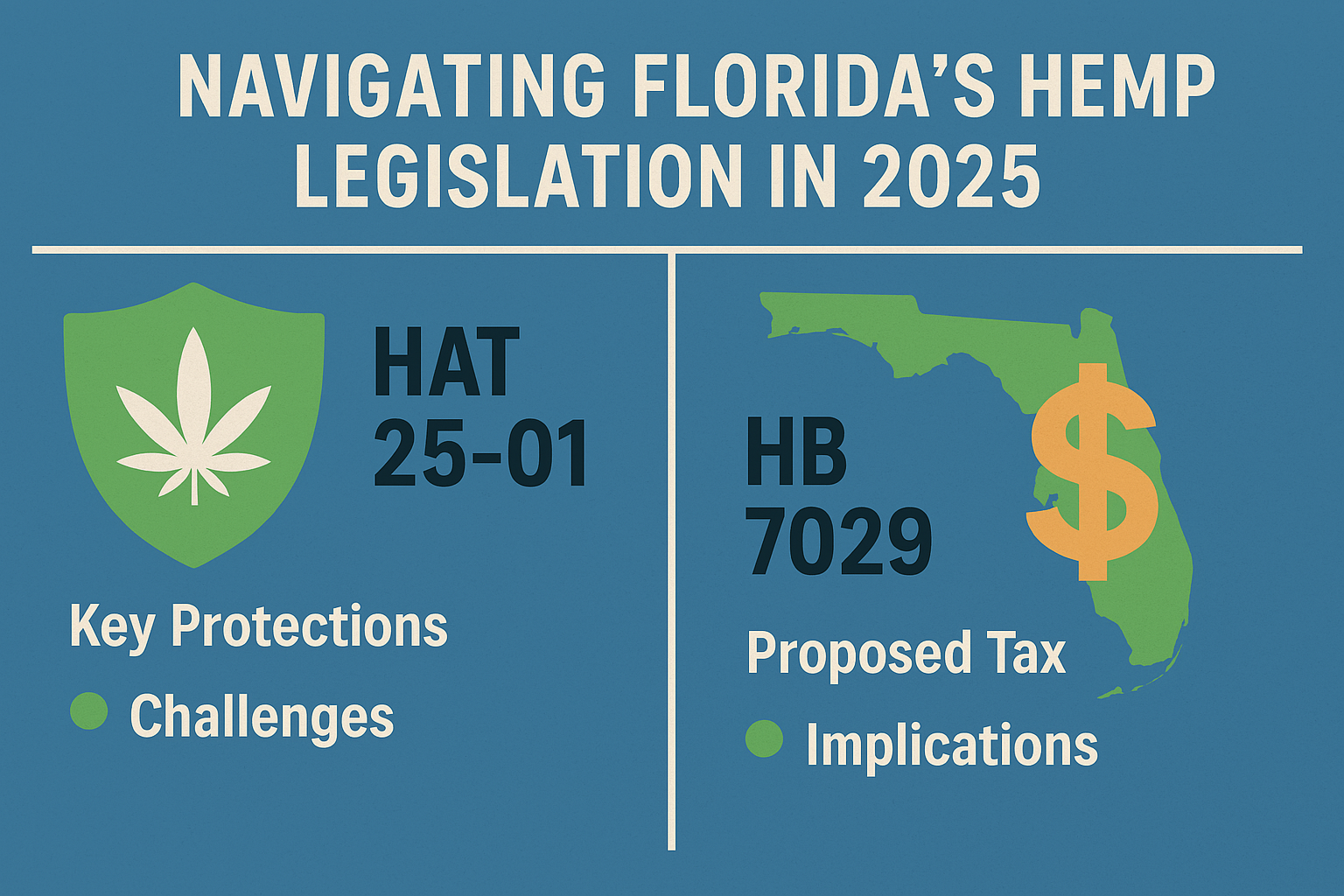
Navigating Florida's Hemp Legislation in 2025
Recent legislative developments in Florida are shaping the future of the hemp and cannabis industry. For hemp business owners and cannabis retailers, keeping up with these changes is more critical than ever. Two prominent bills—HAT 25-01 and HB 7029—have the potential to redefine how hemp consumable products are regulated, taxed, and sold in Florida.
This blog post will walk you through the current state of these bills, the protections and challenges they pose, and what you, as a stakeholder, can do to advocate for a fair and thriving hemp industry in the Sunshine State.
Understanding HAT 25-01
What is HAT 25-01?
The HAT 25-01 bill explicitly protects the sale of hemp consumable THC products in Florida. Its primary goal is to ensure these products are safe for adult consumers while keeping them out of the hands of minors. After the restrictive (and widely criticized) SB 438 threatened the hemp market, the introduction of HAT 25-01 marks a step forward for the industry. However, the current language in the bill leaves room for improvement.
Key Protections in HAT 25-01
-
Consumer Safety
The bill implements strict guidelines to ensure the safety of hemp-based THC products sold in Florida. This includes quality control measures and restrictions to prevent underage access.
-
Retailer Security
Unlike SB 438, which could have stifled the industry, HAT 25-01 keeps the door open for hemp retailers to continue operating.
While these elements establish a strong foundation for the hemp industry, there are lingering challenges that require amendment to ensure the bill fully supports market growth and innovation.
Challenges That Need Addressing
-
Direct-to-Consumer Sales (DTC)
While HAT 25-01 outlines permit requirements for direct-to-consumer sales, the language is currently vague. This lack of clarity could create unnecessary hurdles for online sales—a critical revenue stream for many hemp businesses. The Roundtable has urged the Chair of the Florida House’s Housing, Agriculture, & Tourism Subcommittee to clarify DTC requirements to avoid stifling this channel.
-
Standardized THC Milligram Limits
The bill fails to establish consistent THC milligram limits for hemp beverages and edibles. Without standardization, retailers and manufacturers may struggle to comply with ambiguous rules, potentially deterring innovation in product development.
-
Reasonable Labeling and Packaging Requirements
While protecting consumer safety is paramount, some of the proposed labeling and packaging requirements could pose logistical and financial challenges for hemp businesses. Establishing reasonable and uniform guidelines is essential to ensure compliance without unnecessary burdens.
Advocacy Efforts and Progress
The Roundtable has submitted comments to the Chair of the Florida House’s Housing, Agriculture, & Tourism Subcommittee, highlighting these concerns and proposing revisions. Encouragingly, the Chair has expressed willingness to consider changes, particularly surrounding DTC sales requirements. This progress demonstrates the importance of collaborative advocacy to shape hemp legislation that benefits both businesses and consumers.
HB 7029: The New Tax Bill on Hemp Products
Another bill making waves in Florida’s hemp community is HB 7029, which aims to introduce a tax structure for hemp consumable products. While taxation is an expected aspect of regulation, the proposed rates in HB 7029 are raising eyebrows.
Proposed Tax Structure Under HB 7029
-
General Tax on Hemp Products
A sweeping 60% tax on the wholesale price of all hemp consumable products is outlined in HB 7029. This significant tax will apply to retailers, manufacturers, and wholesalers alike, potentially impacting profit margins and consumer prices.
-
Specific Tax for Beverages
Hemp beverages face a different tax structure:
-
A $2.25 per gallon tax for bulk sales.
-
A 29 cents per pint tax for containers of 1 gallon or less.
These rates are modeled after Florida’s excise tax for alcoholic beverages like beer and wine, which sponsors argue is a reasonable approach.
Implications of HB 7029 for the Hemp Industry
The tax burdens proposed in HB 7029 could be a significant challenge for businesses at every level of the supply chain. Retailers, manufacturers, and wholesalers may struggle to maintain competitive pricing, while consumers might face higher costs for hemp products.
Though taxing hemp products provides revenue for regulation and oversight, an overly aggressive tax structure risks stifling the industry’s growth. Florida hemp stakeholders need to advocate for a balanced approach—one that ensures product safety and fairness without discouraging innovation or accessibility.
What Can Stakeholders Do?
The evolving legislative landscape in Florida highlights the need for proactive advocacy. Here are actionable steps you can take to make your voice heard:
-
Stay Informed
Keep up-to-date with legislative progress on HAT 25-01 and HB 7029. Sign up for alerts from industry groups and participate in discussions to stay ahead of changes.
-
Engage with Lawmakers
Reach out to state legislators and the House’s Housing, Agriculture, & Tourism Subcommittee. Share how these bills impact your business and suggest practical amendments.
-
Collaborate with Industry Groups
Join forces with organizations like the Roundtable to strengthen the collective voice of Florida’s hemp industry. Collaborative efforts often carry more weight in legislative discussions.
-
Educate the Public
Engage with your customers and the broader community to highlight how these bills could affect product pricing and availability. Encouraging their support can amplify your advocacy efforts.
-
Adapt Your Business Strategy
Prepare for potential changes by evaluating how new regulations and taxes might affect your operations. Consider strategies to offset costs and maintain competitive pricing if HB 7029 passes in its current form.
A Future for Florida’s Hemp Industry
The introduction of HAT 25-01 and HB 7029 demonstrates that Florida is moving toward a more structured and regulated hemp industry—but much work remains. By addressing critical challenges through thoughtful amendments and advocating for fair taxation, hemp industry professionals can help shape legislation that balances safety, innovation, and economic opportunity.
Together, we can ensure that Florida’s hemp market continues to thrive.




